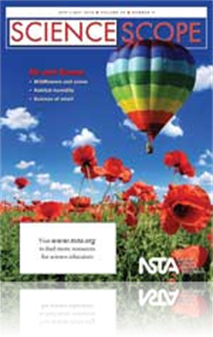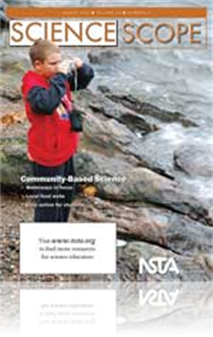All Science Scope resources
Journal Article
Science Sampler: A project-based environmental unit for teaching content through inquiry
Recent science education reform efforts for adolescents have attempted to engage students in science by using project-based instruction (Rivet and Krajcik 2008). The features of project-based learning (PBL) are consistent with the learning needs of m...
Journal Article
Home Sweet Home: How to Build a Madagascar Hissing Cockroach Habitat Out of Recycled Materials
Madagascar hissing cockroaches (MHC) are amazing insects that can be an integral part of an effective science learning and teaching environment. MHCs have a fascinating social structure. They make excellent pets, teach students how to properly care f...
Journal Article
The Adventures of the Gray Whale: An Integrated Approach to Learning About the Long Migration
Using migration as a springboard, students can begin to understand patterns of survival and interdependence that exist within nature, as well as humankind’s role in modifying these patterns. This mini-unit involves a series of integrated activities...
Journal Article
Tried and True: Soil is more than just dirt
This article describes a series of activities in which students investigate soil, culminating in the biomimicry of reducing landfill waste. After students learned about soil’s ecosystem structure and the function of its food web with nutrient cycli...
Journal Article
Science Sampler: Smelling the chocolate—The Perks of modeling habit of mind
Branston, a sixth-grade urban charter school student, used scientific habits of mind to explain a real event. This was due to a series of lessons that make up the “smell” unit (Krajcik et al. 2006), a six-week, project-based unit to develop a mod...
Journal Article
Everyday Engineering: A little flash (of) light
The flashlight is a simple device that is composed of a lightbulb, usually two cells connected in series, a housing, a switch, and a reflector for the light. All flashlights essentially use these parts to complete a circuit that converts the stored c...
Journal Article
Classroom Terraria: Enhancing Student Understanding of Plant-Related Gas Processes
Despite our best teaching efforts, many students hold misconceptions related to the roles plants play in gas-related processes (Amir and Tamir 1994; Hershey 1992; 2004). In an effort to remedy this problem, the author presents a series of activities ...
Journal Article
Science Sampler: Bringing scientific inquiry alive using real grass shrimp research
This lesson was developed for middle school students using actual research on grass shrimp (Palaemonetes pugio) to illustrate the process of a scientific investigation. The research was conducted at Savannah State University and funded by the Nationa...
Journal Article
In the first months of 2009, the International Year of Astronomy, the authors developed an educational project for middle-level students connected with the first astronomical discoveries that Galileo Galilei (1564–1642) made 400 years ago. The proj...
Journal Article
Green Science: Investigating green—Creating surveys to answer questions
Being green means different things to different people. Some suggest that being green means saving energy, not wasting paper towels, going solar, harnessing wind, using less fertilizer, or buying products that are organically grown. Given that being ...
Journal Article
Scope on Safety: Battery safety basics
Batteries commonly used in flashlights and other household devices produce hydrogen gas as a product of zinc electrode corrosion. The amount of gas produced is affected by the batteries’ design and charge rate. Dangerous levels of hydrogen gas can ...



